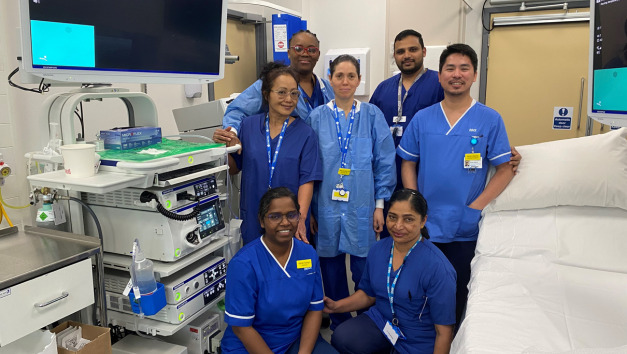
Spotlight
Third room opens at Bridgwater Hospital’s endoscopy unit
Patients in Somerset who need an endoscopy are benefitting from shorter waiting times.
It’s all thanks to a third operating room that has been running at our endoscopy unit at Bridgwater Community Hospital since October 2022.
It means that we now have a total of eight endoscopy rooms across Somerset – three at Bridgwater Hospital, three at Musgrove Park Hospital and two at Yeovil District Hospital – which treat around 1,500 patients every month.
Dr Emma Wesley, clinical lead for endoscopy across the NHS in Somerset, said:
“We are really pleased to have opened this third endoscopy room at Bridgwater Hospital as it has greatly increased our capacity so we can treat many more patients every year.
“At the same time, it has given us a good opportunity to look at the efficiency of the current accommodation for endoscopy at Bridgwater Hospital.
“We’ve made a few subtle changes to create single sex recovery areas and a better configuration of the suite that have improved the flow for patients around the unit, making it easier for our colleagues to care for patients, as well as a much better environment for our reception team.
“The time saved by getting patients in and ready for their procedure, along with the additional room, means we can see many more patients than before.
“We now have a dedicated room for physiology tests and transnasal endoscopy, which is a more comfortable test for patients than a traditional endoscopy which is done via the mouth. It means we can concentrate on higher risk patients and procedures in our unit at Musgrove Park Hospital.
“Waiting times for an endoscopy procedure in Somerset are among the lowest in the south west. In May 2021 the waiting list was over 1,000 but we’ve managed to halve that by February 2023.
“The opening of the third room in Bridgwater is helping to bring this down even further, especially for patients needing an upper gastrointestinal endoscopy.
“The vast majority of patients who have been referred on an urgent cancer pathway (known in the NHS as two week waits) are seen within this time and we are improving our surveillance of patients who tend to come in every three or five years for a check.
“In the longer term we are looking forward to even bigger capacity as endoscopy is a key part of the Musgrove 2030 surgical centre development, which is due to be in operation in 2025, along with a planned community diagnostic centre in Yeovil.”
An endoscopy covers most scopes – either through a person’s mouth, bowels, or nose. It aims to investigate symptoms and allows clinicians to perform therapy, such as removing polyps or stopping bleeding. It can also be used to remove a small sample of tissue to be looked at more closely by healthcare professionals.
Dr Wesley added: “For people who have symptoms such as difficulty swallowing, are seeing blood in their bowel motions, or notice a change to their normal bowel habit, we would advise visiting your GP, who may refer you for either an endoscopy or colonoscopy.
“These procedures detect illnesses such as bowel cancer, issues in the stomach or feeding/eating difficulties. They can also help to rule out cancer.”

